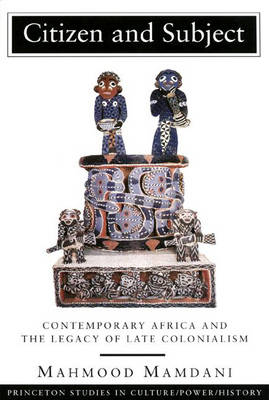
Citizen and Subject
Princeton University Press (Verlag)
978-0-691-02793-7 (ISBN)
- Lieferbar
- Versandkostenfrei
- Auch auf Rechnung
- Artikel merken
In analyzing the obstacles to democratization in post- independence Africa, Mahmood Mamdani offers a bold, insightful account of colonialism's legacy--a bifurcated power that mediated racial domination through tribally organized local authorities, reproducing racial identity in citizens and ethnic identity in subjects. Many writers have understood colonial rule as either "direct" (French) or "indirect" (British), with a third variant--apartheid--as exceptional. This benign terminology, Mamdani shows, masks the fact that these were actually variants of a despotism. While direct rule denied rights to subjects on racial grounds, indirect rule incorporated them into a "customary" mode of rule, with state-appointed Native Authorities defining custom. By tapping authoritarian possibilities in culture, and by giving culture an authoritarian bent, indirect rule (decentralized despotism) set the pace for Africa; the French followed suit by changing from direct to indirect administration, while apartheid emerged relatively later. Apartheid, Mamdani shows, was actually the generic form of the colonial state in Africa.
Through case studies of rural (Uganda) and urban (South Africa) resistance movements, we learn how these institutional features fragment resistance and how states tend to play off reform in one sector against repression in the other. Reforming a power that institutionally enforces tension between town and country, and between ethnicities, is the key challenge for anyone interested in democratic reform in Africa.
Mahmood Mamdani received his Ph.D. in Government from Harvard University and is the founding Director of the Centre for Basic Research in Kampala. A Fellow of the African Academy of Sciences, he is the author of The Myth of Population Control and Politics and Class Formation in Uganda.
AcknowledgmentsIIntroduction: Thinking through Africa's Impasse3Pt. IThe Structure of Power35IIDecentralized Despotism37IIIIndirect Rule: The Politics of Decentralized Despotism62IVCustomary Law: The Theory of Decentralized Despotism109VThe Native Authority and the Free Peasantry138Pt. IIThe Anatomy of Resistance181VIThe Other Face of Tribalism: Peasant Movements in Equatorial Africa183VIIThe Rural in the Urban: Migrant Workers in South Africa218VIIIConclusion: Linking the Urban and the Rural285Notes303Index339
| Erscheint lt. Verlag | 21.4.1996 |
|---|---|
| Reihe/Serie | Princeton Studies in Culture/Power/History |
| Verlagsort | New Jersey |
| Sprache | englisch |
| Maße | 152 x 235 mm |
| Gewicht | 539 g |
| Themenwelt | Geschichte ► Teilgebiete der Geschichte ► Wirtschaftsgeschichte |
| ISBN-10 | 0-691-02793-5 / 0691027935 |
| ISBN-13 | 978-0-691-02793-7 / 9780691027937 |
| Zustand | Neuware |
| Informationen gemäß Produktsicherheitsverordnung (GPSR) | |
| Haben Sie eine Frage zum Produkt? |
aus dem Bereich


